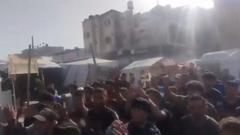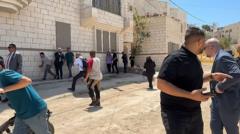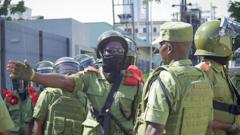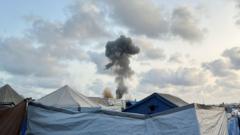A wave of protests in southern Gaza reflects escalating public frustration with Hamas, emphasizing demands for an end to violence and better living conditions as civilians face relentless airstrikes and displacement.
Protests Against Hamas Surge in Southern Gaza Amid Ongoing Conflict

Protests Against Hamas Surge in Southern Gaza Amid Ongoing Conflict
Activists in Gaza have taken to the streets for a third consecutive day, demanding an end to Hamas's control as the humanitarian crisis worsens.
In a remarkable show of defiance, protests against Hamas erupted for the third consecutive day in southern Gaza, as hundreds of demonstrators voiced their demands for the end of the militant group's rule. Videos shared on social media captured the passionate crowds chanting, "Out! Out! Out! All of Hamas, out," highlighting a growing impatience with ongoing conflict and its devastating consequences.
The protests, which began on Monday, were largely organized by young people seeking to express their discontent in a region where dissent against Hamas is fraught with risk. Activists reported that many participants were en route to community kitchens for food when they joined the protests, holding on to their cooking pots while voicing their demands. The surge of activism comes in response to a controversial statement by Hamas official Sami Abu Zuhri, who described the conflict with Israel as "eternal," prompting a backlash against the group's leadership.
The current wave of demonstrations primarily took place in Khan Younis, where protestors directed their ire toward Hamas for what they perceive as an exploitation of their suffering. One protestor expressed disdain, saying, "To those with Hamas, be aware the people of Gaza will dig your grave."
Critics emphasize that the climate for dissent in Gaza has been tense, with threats issued to journalists cautioning against negative reporting that could lower public morale. The situation escalated further as Israel intensifies its air strikes on Khan Younis, coinciding with mass evacuation orders and heightened fears for the safety of civilians.
One protestor, referred to as Alaa for reasons of anonymity, detailed harrowing experiences of displacement and fear of retaliation from Hamas. "The people do not care anymore about Hamas' attempts to suppress their voice because they are literally dying from hunger, evacuation, and the bombings," he said, echoing the sentiments of many equally frustrated individuals.
Occupying a pivotal role in these protests is Moumen al-Natour, a lawyer and former political prisoner, who identifies the current humanitarian crisis as a catalyst for revolt. “The fatigue, effort, and cost of displacement is pushing people to revolt against Hamas, who refuse to surrender and hand over their weapons,” he remarked.
The dire humanitarian situation continues to worsen, with recent figures from the United Nations indicating mass displacements and losses of life in the ongoing conflict. Since the commencement of hostilities on October 7, over 53,000 people have reportedly died, underscoring the urgency and gravity of the situation as Gazans rally against both their internal leadership and external threats.





















